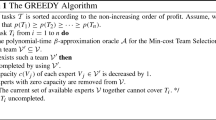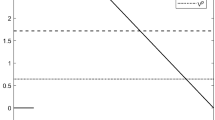Abstract
Sufficient conditions for the existence and Lipschitz continuity of optimal strategies for static team optimization problems are studied. Revised statements and proofs of some results appeared in the literature are presented. Their extensions are discussed. As an example of application, optimal production in a multidivisional firm is considered.
Similar content being viewed by others
References
Akbari A., Hess J., Kagiwada H., Kalaba R.: The equivalence of team theory’s integral equations and a Cauchy system: sensitivity analysis of a variational problem. Appl. Math. Comput. 6, 21–36 (1980)
Alessandri A., Cervellera C., Sanguineti M.: Design of asymptotic estimators: an approach based on neural networks and nonlinear programming. IEEE Trans. Neural Netw. 18, 86–96 (2007)
Alessandri A., Cervellera C., Sanguineti M.: Functional optimal estimation problems and their approximate solution. J. Optim. Theory Appl. 134, 445–466 (2007)
Arrow K.J.: Individual Choice Under Certainty and Uncertainty. Belknap Press, Cambridge (1984)
Berkovitz L.D.: Convexity and Optimization in \({{\mathbb R}^n}\) . Wiley, New York (2002)
Clarke F.H.: Optimization and Nonsmooth Analysis. Wiley, New York (1983)
Dudley R.M.: Real Analysis and Probability. Cambridge University Press, Cambridge (2002)
Gnecco, G., Sanguineti, M.: Lipschitz continuity of the solutions to team optimization problems revisited. In: Proceedings of International Conference on Mathematical Science and Engineering, Venice, Italy (2009)
Gnecco, G., Sanguineti, M.: Suboptimal solutions to network team optimization problems. In: CD-Proceedings of International Network Optimization Conference (INOC), Pisa, Italy (2009)
Gnecco, G., Sanguineti, M.: Smooth optimal decision strategies for static team optimization problems and their approximations. In: Lecture Notes in Computer Science. Proceedings of 36th International Conference SOFSEM 2010, vol. 5901, pp. 440–451. Springer, Heidelberg (2010)
Haykin S.: Neural Networks. A Comprehensive Foundation. Prentice-Hall, Englewood Cliffs (1999)
Hess J., Ider Z., Kagiwada H., Kalaba R.: Team decision theory and integral equations. J. Optim. Theory Appl. 22, 251–264 (1977)
Hiriart-Urruty J.B., Lemaréchal C.: Convex Analysis and Minimization Algorithms I. Springer, Berlin (1993)
Kim K.H., Roush F.W.: Team Theory. Ellis Horwood Limited, Chichester (1987)
Klein J.H.: Review of ‘Team Theory, by K. H. Kim and F. W. Roush, Ellis Horwood Limited, Chichester, 1987’. J. Oper. Res. Soc. 39, 695–696 (1988)
Krainak J.C., Speyer J.L., Marcus S.I.: Static team problems—Part I: sufficient conditions and the exponential cost criterion. IEEE Trans. Authom. Control 27, 839–848 (1982)
Maroto J.M., Moran M.: Lipschitz continuous dynamic programming with discount II. Nonlinear Anal. 67, 1999–2011 (2007)
Marschak J., Radner R.: Economic Theory of Teams. Yale University Press, New Haven (1972)
Packel E.W.: Review of ‘Team Theory, by K. H. Kim and F. W. Roush, Ellis Horwood Limited, Chichester, 1987’. SIAM Rev 30, 676–677 (1988)
Pappalardo M.: Multiobjective optimization: a brief overview. In: Chinchuluun, A., Pardalos, P., Migdalas, A., Pitsoulis, L. (eds) Pareto Optimality, Game Theory and Equilibria, Springer Series Optimization and Its Applications, vol. 17, pp. 517–528. Springer, New York (2008)
Rockafellar R.T., Wets R.J.B.: Variational Analysis. Springer, Berlin (2004)
Rudin W.: Real and Complex Analysis. McGraw-Hill, Singapore (1987)
Rudin W.: Principles of Mathematical Analysis, III Edition. McGraw-Hill, Singapore (1976)
Witsenhausen H.S.: Equivalent stochastic control problems. Math. Control Signals Syst. 1, 3–11 (1988)
Author information
Authors and Affiliations
Corresponding author
Additional information
The authors were partially supported by a grant “Progetti di Ricerca di Ateneo 2008” of the University of Genoa, project “Solution of Functional Optimization Problems by Nonlinear Approximators and Learning from Data”.
Rights and permissions
About this article
Cite this article
Gnecco, G., Sanguineti, M. Team optimization problems with Lipschitz continuous strategies. Optim Lett 5, 333–346 (2011). https://doi.org/10.1007/s11590-010-0213-y
Received:
Accepted:
Published:
Issue Date:
DOI: https://doi.org/10.1007/s11590-010-0213-y




